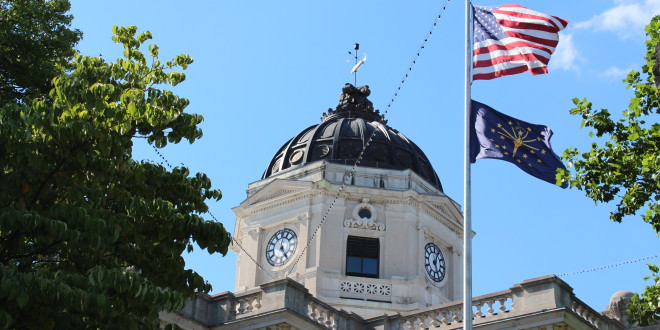Podcast: Play in new window | Download (Duration: 11:37 — 16.0MB)
Last year an attorney for the city of Bloomington discovered what she said was a problematic piece of city code, a law that she said was itself illegal. The clause was in the city’s rules governing historic districts, and within a few months the City Council corrected the glitch.
There was relatively little debate at the time, but in the months since the correction, it’s become clear the change could have longstanding effects on property rights, particularly in two city neighborhoods.
WFHB looked into the history of the error and how it led residents to spend years organizing, campaigning and voting for ways to protect their neighborhoods, ways that, according to the city, never technically existed. Assistant News Director Joe Crawford brought us that story, including ongoing questions about how the city has dealt with the issue, for a WFHB feature exclusive.
~~~
Maybe the strangest part of the convoluted changes to Bloomington’s Historic Preservation code is that they fundamentally alter decisions made years ago, decisions that have since been used as the basis for many, many more decisions. Last November, when Elizabeth Cox-Ash first began to understand what was in store for her McDoel Gardens Neighborhood she said she felt duped.
“I really feel that we’ve been bamboozled,” Cox-Ash said.
Cox Ash has been an active member of the McDoel Gardens neighborhood association for years and she fought hard to get the area designated as a historic conservation district in 2001. The idea was to prevent radical changes to that area just south of downtown by setting limits on what could be built there and what could be torn down.
But by November, when she attended a meeting of the city’s Historic Preservation Commission, she was learning that even though she lobbied and voted for a conservation district, and the city council had approved a conservation district, 13 years later she was not living in a conservation district.
“In all the time that I’ve been on the Commission, I’ve never seen anything that has so offended me,” said Commission member Sandi Clothier, speaking at the same meeting in November.
Clothier had just been officially informed of the amendments to city code, which the City Council had already approved. She was frustrated the city administration didn’t consult with the Commission before making the changes, which she said were misguided.
“I don’t know how it’s even legal,” she said. “You can go back and say ‘Oh well, we didn’t do this right and we didn’t do that right,’ but there are other ways to fix laws. And I think this is just outrageous.”
To understand the revisions that made Cox-Ash and Clothier so angry, you have to know that until recently, there were two distinct options for residents who wanted to set limits on development in their neighborhoods in hopes of preserving their historic character.
Those residents could try to get the city to designate their areas as a full-blown historic districts. That would mean Clothier’s group, the Historic Preservation Commission, would review almost any changes they and their neighbors wanted to make to the outsides of their homes.
Full historic districts can prevent property owners from destroying or altering historic architecture, from doing about anything that would be out of character with the surrounding houses. But some neighborhoods, although they wanted some rules, didn’t want to go quite that far. And there was an alternative, a lighter form of regulation, what were called conservation districts. In conservation districts, the Commission only has a say when buildings are constructed, demolished or moved.
Cynthia Bretheim helped draft the guidelines for the conservation district in the Prospect Hill neighborhood, which was approved in 2008.
“People who lived here could modify their homes as needed,” Bretheim said. “We wanted people to have freedom to do that. But at the same time we didn’t want that to get out of hand so that we’d have a 3,600-square-foot house next to an 800-square-foot house. Then the 800-square-foot house would look really stupid.”
When the city changed the rules last year, it did away with the city’s two conservation districts in Prospect Hill and McDoel Gardens. It turns out, as city attorney Patty Mulvehill discovered, state law is very specific about how cities can form those districts.
“If you establish a conservation district, that district automatically expires on its three-year anniversary date unless a majority of the property owners in the district object to the elevation in writing,” Mulvehill said. “While we polled both of those historic districts at the three-year mark, we didn’t hear back from at least 50 percent of the property owners.”
Mulvehill requested an opinion from the state attorney general, who confirmed in August that the city’s law was indeed invalid.
And there’s not much debate about that point: the ordinance the city council passed during a six-hour-long meeting in April of 1995 was wrong. What’s more controversial is what the city administration did with that information.
State law says that once a conservation district expires, things don’t go back to the way they were before. If a majority of property owners don’t vote to keep the conservation district, the area automatically elevates to a full-blown historic district. Suddenly property owners are forced to go before a city commission if they want to add on to their houses or do renovations or, in some cases, make simple changes like paint color.
And so according to Mulvehill, both McDoel Gardens and Prospect Hill neighborhoods are now full-blown historic districts.
“The elevation occurred,” she said. “The city can’t undo that because state law has already required that to happen.”
But, of course, state law doesn’t specifically address circumstances in which residents are led to believe they are lobbying and voting for a conservation district, and the city council approves a conservation district, and no one is apparently any the wiser that they’re all actually voting and lobbying and approving something else entirely. The opinion from the attorney general doesn’t address that either.
Some, including Sarah Ryterband, a member of the Prospect Hill Conservation District Review Committee, have suggested the decision to retroactively elevate the two conservation districts might been due to fear of lawsuits.
“The fear in this case, like so much in our society, is imaginary,” Ryterband said.
The city has been sued over conservation districts in the past. In 2001 property owner Robert Shaw tried to prevent the City Council from approving the McDoel Gardens designation, but a court dismissed the suit because Shaw couldn’t prove he’d been damaged by the restrictions, which hadn’t taken effect yet. WFHB reached out to Shaw and his attorney, but neither returned calls for this story.
Mulvehill said city staff did consider the city’s legal liability as it considered its options last year.
“It’s always possible for the city to be sued, regardless of the context,” she said.
Residents of both Prospect Hill and McDoel Gardens have been asked before whether they’d like their neighborhoods elevated to full-blown historic districts. They were given that option during referendums in 2004 and 2011.
And they overwhelmingly refused. In 2004, of the 126 property owners in McDoel Gardens who gave their opinions, only five people said they wanted the elevation. That’s just less than 4 percent.
In Prospect Hill’s referendum in 2011, it was closer. About 27 percent of those respondents were in favor, leaving 73 percent opposed.
During both referendums, most voters wanted to simply keep the conservation districts they already had. But, as they found out years later, state law required support from a majority of property owners, not a majority of voters. Because too few property owners voted, the referendums didn’t mean much in the eyes of state law.
But they did mean something to some members of the Historic Preservation Commission, who voiced anger during the meeting in November. Member and Prospect Hill resident Doug Wissing said the owners should be given a second chance to vote.
“There had to have been an option, a choice made by somebody that we didn’t go to the neighborhoods, we didn’t want to talk to them,” Wissing said. “This, again, runs so counter to my sense of grassroots democracy, what this institution is about, what this community is about, what this Commission is about.”
Wissing and Clothier made their statements of frustration at a small meeting in the McCloskey Room at City Hall in what they might have assumed would be a relatively private conversation. There were apparently no reporters present and the meeting wasn’t being filmed.
WFHB only obtained the recording last week through a public records request to City Legal. Since that meeting, those two, as well as former Commission member Danielle Bachant Bell, who also spoke out at the meeting, have declined to comment to WFHB.
And after that meeting there was a major shakeup on the Commission. Mayor Mark Kruzan, whose administration’s actions were the subject of much of the criticism, removed Wissing from the Commission in December. The mayor appoints the entire commission, and he also chose not to renew the term of Bachant-Bell. And at the end of the year Clothier left on her own accord, ending a 13-year stint on the Commission.
WFHB asked Kruzan to comment about the exodus, but he referred all questions to City Legal.
One member of the Commission who did speak to WFHB was Duncan Campbell, a longtime preservation scholar and advocate who has been on the Commission for decades. Campbell said the Commission has worked hard over the years to make residents and neighborhoods comfortable with historic protection.
“This was a blow to the Commission because it makes it look as if the Commission kind of side-swiped the neighborhoods, or had some evil intent, and tricked them into becoming historic districts,” Campbell said. “That just feeds into the hands of people who are against historic preservation and particularly people have interests in developing those neighborhoods for other uses.”
So far, Mulvehill said she isn’t aware of any lawsuits challenging the new rules in McDoel Gardens and Prospect Hill. Nancy Hiestand, the city staff member who works most closely with the districts, said she will be working with the neighborhoods in the coming months to draft new rules for what are now full historic districts.
Hiestand said she hopes to get as close as possible to what residents wanted when they supported the conservation districts, what she called a “light touch on their regulation”
 WFHB Bloomington Community Radio
WFHB Bloomington Community Radio


